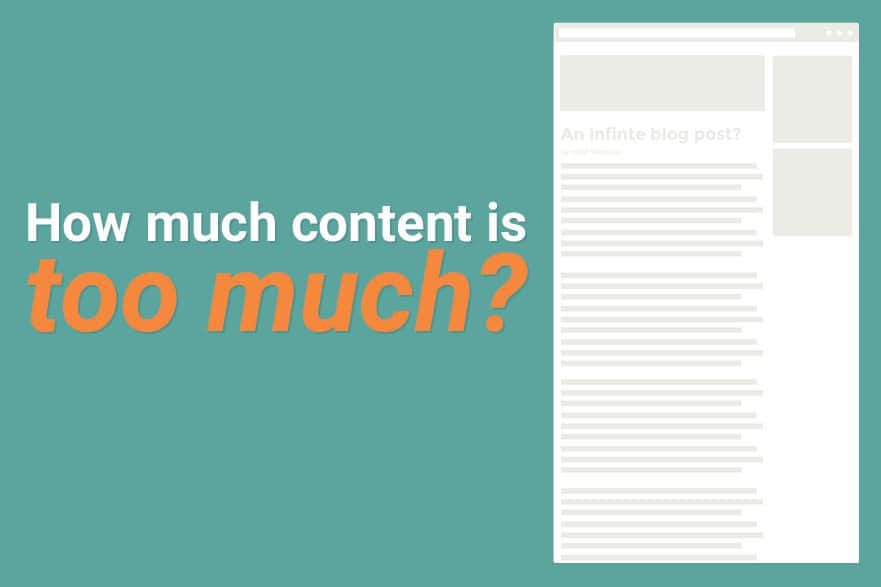Learn with Us
How Much Content is Too Much?

Chances are, you don’t take the same kind of reading material with you everywhere you could be reading. The places where you want to leaf through a magazine quickly differ from where you’d bring a heavyweight novel, for example.
Your website – and your content – can be more than just a novel, or just a magazine. If you keep on top of your content library and curate it carefully, you’ll end up with a very powerful mix of content forms and volumes.
“Length is not an indicator of quality… ish”
HubSpot blog editor Corey Eridon threw that line out during a talk at #Inbound15 – and the numbers seem to back it up pretty well. You just can’t rely on a higher word count providing better value… Unless you know what kind of value you’re going for.
Blogging tips from HubSpot Blog Editor @Corey_bos. “Length is not an indicator of quality…ish” #INBOUND15 pic.twitter.com/jr3ErTWuSX
— HubSpot (@HubSpot)
September 10, 2015
Just like your choice in reading material for different idle locations, certain kinds of content are best suited for attracting different kinds of attention.
- Some content – typically middling-length articles with images, or timely updates – tend to attract social sharing more than links.
- Longer, pillar-style content with deep analysis or detailed information, tends to be less sharable but gets linked to from other pages, because of its value as a resource.
The relationship between word count and organic traffic is much less reliable.
There are a lot of reasons for this. Factors such as search demand for a given topic, other existing material on what you’ve written about, and how much ground must be covered in some subjects in order to represent them, varies in big ways.
You’ll find a lot of advice about blogging and content creation that suggests brevity is better… But what is it better for? After all, if you want links, but you’re not concerned with social sharing, maybe an exhausting essay is worth writing? If links aren’t a target, but you want visibility now then perhaps a shorter, snappier article will do the job.
How do we figure out if we’ve written too much?
It’s not always easy to plan beforehand just how much you’re going to write. Some topics lend themselves to deep detail more than others, and your knowledge about those topics (or the research you do as you plan) can have an unexpected influence on your word count.
Can we prevent writing too much?
Sort of – and a large part of it comes down to preparation. As you write, keep in mind:
- Decide where the content’s going to go before you actually draft. Does your topic need the scope of an ebook or a page on your website? Should it be a blog post?
- Too much text can overwhelm the reader, so keep paragraphs short and use lists where possible – draw the eye around the page with some designed content if you can.
- Balance with images and video where you can. If you have a drawing or a picture, there’s less need to write about it.
- Cover one subject or intent per page. This will keep you on track for shorter work.
- Reference other text in links, wherever possible. All the links in this list? They help keep this article on task by referring back to other details – there’s no value in rewriting that information here, when you can find it just as easily through a link.
How can we trim bloated content back to an acceptable amount?
Here we get into the big nasty bog of editing – and all of the advice that goes with it. If you’re really interested in this work, there are resources available that will help you keep sentences shorter, make tighter statements, and overall make every word count.
That’s not what we want to do with web articles – at least, not every time. Keep an eye out for:
- passages that could be their own pieces of content – cut & paste them into new documents, pages, or blog entries so they can do a better job that way.
- opportunities to use galleries (you’ll have to find images if you don’t have them) to cut out extra information and demonstrate instead.
- opportunities to use pagination or create a series, to break up longer but necessarily single-focus pieces, to make them easier to read as shorter portions of information.
In general, you’ll still know you’re done when you’ve gotten your point across.
Yes, there’s value in brevity – but it’s not everything, clearly. However, when you’ve added every detail, marked every list item, and gotten across whatever message you need to – it’s still usually a good idea to stop writing.
Whether your subject matter is worth 200 words or 20,000 – if you write any more than you must… Well, that’s too much content.
Source: Hello BLOG


